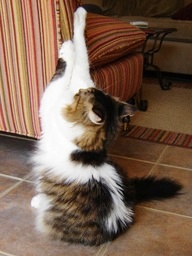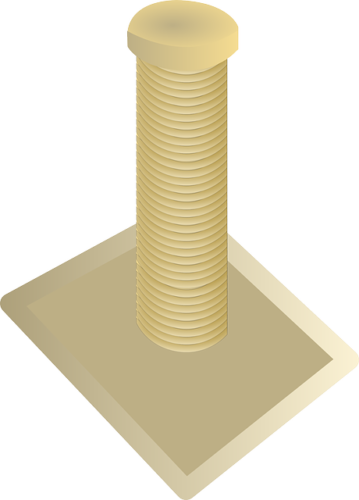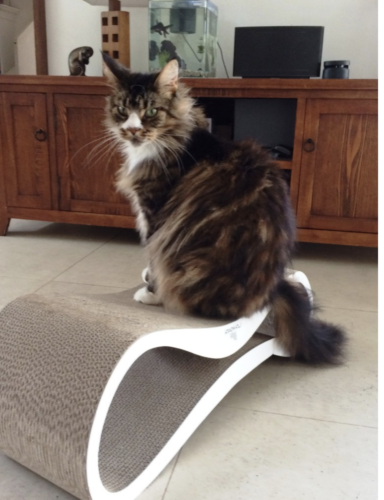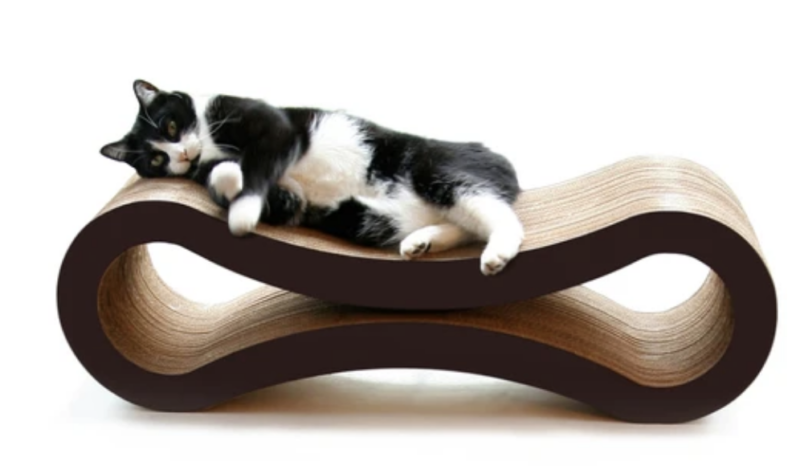Cat scratching behaviour: a natural behaviour or a problem one?
Understanding Cat Scratching Problems: Summary
- Cats have claws and need to use them. Scratching sharpens claws and also puts your cat’s scent over the scratched area making the cat feel secure.
- Management of the cat anxiety issue involves redirecting the cats scratching on to appropriate scratching areas – scratching posts and placing these where the cat likes to scratch.
- Long term solutions involve encouraging the cat to scratch and also reducing any anxieties within the home.
Why Cats Scratch
Cats scratching behaviours around the home are one of the most common problems for cat owners. Yet, cat scratching behaviour is natural and cats need to do it. It may help to understand this behaviour and how to stop your cat scratching furniture.
Although most of us think that cats scratch to sharpen their claws, this is not the only reason. Cats tend to scratch where their scent will linger. Scratching deposits scent from the scent glands on their paws onto objects that have other scents.
So, objects near doorways or corridors or where your guests sit. This is where you need to place your scratching post.
Reasons why cats scratch
There are several reasons why cats scratch:
- to maintain the health & sharpness of their claws
- placing their scent on objects surrounding them
- to stretch & burn off energy
- to defend themselves
- because they enjoy it

Where does your cat scratch?
So, your cat likes to scratch! You may have to watch your the cat scratching behaviour of your family feline, to look for clues as to where, when and how the behaviour happens.
What does your cat scratch? Your furniture? The arms of your sofa? Your carpets or curtains? More importantly, ask where does your cat like to scratch? Is it in the corner of the room or, more likely, in a prominent position like the edge of your sofa?
You want your cat to use a cat scratching post rather than scratch your furniture? Think about where you have located the cat scratching post. Best place is where your cat wants to scratch.
If it is inconvenient to have the scratching post in the entrance to your lounge room or in your hallway, you can look at placing a smaller version here or gradually move the scratching post to your preferred location, little by little. Your cat, however, may continue to scratch in the position that they wish to.


Types of cat scratching post
The best scratching post is one that your cat enjoys using for their cat scratching behaviour. You may need to experiment with several types until you find your cats favourite or your may find that having different types is more stimulating for your cat.
Here are the main types of cat scratching posts:
1. Tree trunk cat scratching posts
While this might be the real deal, often it is a little inconvenient to bring a tree trunk into your home. If you have a cat enclosure, however, this might be a good option. Beware of bringing in all the bugs too!
2. Carpet cat scratching posts
Carpet is often wrapped around a central trunk and also used as a sleeping spot for your cat.
3. Sissal cat scratching posts
Rope may be wound around a central post
4. Cardboard cat scratching posts
Often recycled cardboard is enjoyed by cats due to its shreddable nature which can be messy.
(Note by Dr Jo: This is the type my cats love!)
Tips for scratching post use
- Take your cat to their scratching post at times they are likely to need to scratch – on waking, after a meal, after a play session or every hour or so.
- Wait for your cat to use the post and reward them with your attention “Good cat!” or a treat when they do. You can place treats on the post to encourage them to go there when you are absent.
- Some owners like to place their cat’s paws on the scratching post. This needs to be done very gently.
- Close doors: If you have precious areas of your home or pieces of furniture that you do not wish your cat to scratch and you cannot be there to supervise your cat, close the door.
Most of all, be patient! Cat scratching behaviour may take time to change.
Scratching with style
Cheap scratching posts may be effective for your cat. Buy several, place them in areas of your home that your cat likes to scratch. Be prepared to replace them often.
Stylish scratching posts may be so elegant, that they become a statement piece in your home!

Listen to our Pet Problems Solved Podcast
This episode of the Pet Problems Solved Podcast series examines cat scratching behaviour and how to direct them on to appropriate cat scratching posts.
Cat scratching you?
If your cat scratches you, it may be due to aggression and/or anxiety:
- Scared cats will often lash out at the perceived threat. Working on reducing their anxiety will help reduce the amount of attacks on you or other animals.
- Attack cats often enjoy the game. They use this aggression to win resources or to get attention. Understanding cat aggression may help you understand your cat’s scratching.
De-clawing & punishment are not the answer. Nor are water spray bottles.
Frequently asked questions about cat scratching behaviour
Why does my cat scratch around her food?
When cats scratch around their food bowls, it is often a remnant of wild behaviour and hiding their food. this may be saving it for a “rainy day” or covering it to prevent predator detection. This is usually not a problem, so unless you cat is unwell or stressed in other ways, you should not need to stop this behaviour.
How can I stop my cat from scratching at my bedroom door?
Your cat probably wants to be with you or at least get your attention. Make sure that you give them attention at more convenient times , with lots of activities and play, then they are more likely to settle at night.
How can I stop my cat from scratching my carpet?
Your cat has selected the material that they like to scratch. Cover your carpet, for a little while, with carpet runners and place cat scratching posts, which have carpet scratching fabric, in nearby areas.
Dr Jo answering your cat scratching behaviour questions
More cat behaviour and advice
Pets and water sprays: No way!
Cats and catnip
Types of furniture best at surviving pets
About the author: Dr Jo Righetti
Dr Jo Righetti is an animal behaviourist, helping people with pets. With a PhD in behaviour, a diploma in counselling and over 20 years experience in business Pet Problems Solved, Dr Jo understand pets and communicates here knowledge in a motivational manner.
Jo has lots of scratched furniture!
Cat behaviour photos – join us on Pinterest
About this website
Information here is written by Dr Jo Righetti, PhD Animal Behaviourist and is based on scientific research and over 20 years experience of working with people and pets.
More cat behaviour problems
- Cleaning Up Pet Toileting AccidentsCleaning up pet toileting accidents Tips for Cleaning up Pet Pee and Poo Toileting Problems Around Your Home ‘Accidents’ around the home need
- Top 10 Problem Pets – and Problem Pet BehaviourAre you frustrated, angry or puzzled y your pet’s behaviour? Here’s your guide to the top 10 problem pets and problem cat behaviour and dog behaviour…
- Ask Dr Jo – Your Cat Q&As (With adorable Cats to watch!)Ask Dr Jo – Your Cat Q&As in the Fancy Feast Lounge Enjoy our cat videos, and get your feline questions answered, in
- Australia’s cats kill 650 million reptiles a year!At Pet Problems Solved, we LOVE cats. But cats hunt, it’s inevitable. Indoors they hunt toys, food or us. Outdoors they hunt wildlife.
- How to Keep Pets Calm in Stressful SituationsAll pets get stressed at times and some are in a constant state of anxiety, so it helps to know how to keep